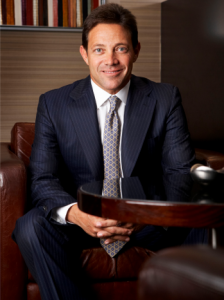World News – Over the past several weeks, the name Tom Prousalis has been a widely searched name on the internet after the opening of the film, The Wolf of Wall Street, starring Leonardo DiCaprio, which is based on the true story of Jordan Belfort and his spectacular rise and fall as a Wall Street stockbroker.
 In an effort to ride the coattails of the movie and the worldwide press it generated, Prousalis’ estranged daughter, Christina McDowell (nee Prousalis), published an open letter in the LA Weekly, an entertainment weekly on the internet, viciously attacking the film, the integrity and character of Messrs. Scorsese and DiCaprio, and her father, to try to capture her “15 minutes of fame.” She succeeded, as her open letter went viral on the internet. It is an understatement to say that the letter has caused immense embarrassment for the director and star of the film, and her father, just so she could be in the Hollywood spotlight, if only for a brief period of time.
In an effort to ride the coattails of the movie and the worldwide press it generated, Prousalis’ estranged daughter, Christina McDowell (nee Prousalis), published an open letter in the LA Weekly, an entertainment weekly on the internet, viciously attacking the film, the integrity and character of Messrs. Scorsese and DiCaprio, and her father, to try to capture her “15 minutes of fame.” She succeeded, as her open letter went viral on the internet. It is an understatement to say that the letter has caused immense embarrassment for the director and star of the film, and her father, just so she could be in the Hollywood spotlight, if only for a brief period of time.
Soon after publication, Tom Prousalis replied to his daughter’s open letter with his own open letter, which details the illicit motives and false statements in her letter.
In view of all of these viral claims, we decided to do a little fact-checking on our own.
Tom Prousalis was a prominent Washington securities attorney who pleaded guilty to securities fraud in New York in a matter involving a corporate client’s IPO more than 14 years ago.
A witness that was set to testify against Prousalis in his trial in New York in 2004 was none other than Jordan Belfort, the so-called “Wolf of Wall Street.” It is unknown what Belfort was going to testify to, since Prousalis claims in his letter that neither he nor his corporate client had any relationship to Belfort or his former brokerage firm, Stratton Oakmont, Inc. Prousalis also claims that he has never even met Belfort.
Halfway through the trial in New York in 2004, Prousalis switched his plea from not guilty to guilty. Belfort, in fact, never testified against Prousalis, despite the false claim of his daughter.
A few days after the trial, and before judgment, sentencing and appellate review, Jerry Knight, a reporter for The Washington Post, wrote a scathing article personally attacking the character and integrity of Prousalis. What is especially noteworthy here is that Prousalis’ case, after more than 10 years of litigation, is now before the U.S. Court of Appeals for the Fourth Circuit and is subject to reversal. In the coming months, we will be following Prousalis’ case carefully. Knight may want to seek legal counsel should Prousalis’ case be reversed.
Below is Prousalis’ open response to Jerry Knight’s article in The Washington Post.
July 21, 2004
Mr. Jerry Knight
The Washington Post
1150 15th Street, N.W.
Washington, D.C. 20071
Re: “Penny-stock Lawyer Nears Day of Reckoning,” by Jerry Knight, The Washington Post, July 19, 2004
Dear Mr. Knight:
I have reviewed the above-referenced article penned by you in Monday’s Washington Post, which you have readily posted on the world wide web. My responses herein are directed at you, personally, and not to The Washington Post, for which I, otherwise, have high regard.
Your article bristles with misleading representations, false statements of fact and false innuendo in a manner that is designed to assassinate the character and integrity of your chosen target. Your writing style resembles that of a false indictment by a nefarious prosecutor rather than the fair and balanced work of a professional journalist. Even the title of your article describes the most negative stereotype that you can levy against a member of the corporate securities bar, who has been in good standing before the bar for more than 25 years. Your virulent motives and manipulation of the facts in the article are self-evident, and you are a disgrace to your profession and The Washington Post.
A good journalist writes an article presenting both sides of a topic in a fair, balanced and professional manner, so that the reader can make an informed judgment. Under the banner of The Washington Post, one presumes that you know how to do your job. Two of the most important jobs of a competent journalist is to fact-check your work and interview your intended target for comment. You failed in both instances. You did not give me the common (or professional) courtesy to respond to the representations in your article prior to publication. (My family and I are long-time residents of the Washington, D.C., metropolitan area, and my office e-mail and telephone numbers in Washington, and my home telephone numbers in McLean and Nantucket, are publicly-listed.) You never contacted me. Instead, without my participation or comment, you wrote a highly biased and defamatory article about me based on misleading representations, false statements of fact and false innuendo. You also had an ethical duty to contact me directly prior to publication so as to write a fair and balanced article. Instead, your article was written to intentionally humiliate and damn me before my family, friends and professional colleagues.
You did not attend my trial in New York (which you did not disclose), and you otherwise do not know and understand the facts and circumstances of my case. You accepted the charges of the government at face value, and you chose not to hear and consider my side of the story. And because I never testified at my trial, you had an affirmative duty to find out why, before you expounded on false presumptions and false statements of fact in your article. The charges in my case were directly related to certain alleged omissions to disclose material facts in my corporate client’s initial public offering (“IPO”) prospectus. A lawyer is not the author of a prospectus – the corporate client is. I was one of several lawyers and law firms representing Busybox, Inc., a Los Angeles, California, based software company, including one of the largest law firms in Washington. Busybox also had two lawyers on its board of directors. I was not an officer or director of Busybox, and, as such, I exercised no authority or control over the business of my client, its prospectus or IPO. Busybox expended all of the investors IPO funds and eventually declared bankruptcy more than a year later. Furthermore, I exercised no authority or control over the expenditure of the funds, and all of my legal fees were fully disclosed in advance to my client under a written retainer agreement. Despite the expenditure of the funds and the ultimate failure of Busybox, neither it, nor any of its officers and directors, was ever charged. Why? Because no crime was ever committed by them, or anyone else. Yet the government charged one of the several lawyers involved in the IPO, and the government’s central legal theory was, very simply – Prousalis did it. And soon after my trial began, and I realized the facts of life in an American courtroom as a criminal defendant, I entered a guilty plea – but not for the reasons you so dramatically state, Mr. Prosecutor. I did not plead guilty because, as you described it, a “star witness” in the name of Jordan Belfort was going to testify against me. (In fact, neither I, nor my client, Busybox, has ever been engaged in business with Mr. Belfort or his former firm, Stratton Oakmont, Inc. Also, I have never met the man.)
You naively presume that when a person pleads guilty that person is, in fact, guilty. But is a person guilty when the full force and resources of the federal government falsely accuses you before a poorly educated jury in a trial in lower Manhattan, involving sophisticated federal securities laws, regulations and rules, when such person pleads guilty rather than face the possibility of losing a jury trial which may result in 20 years of imprisonment? Or do you save your family further heartbreak and millions of dollars in legal fees and cop a plea of guilt for a much shorter sentence, like more than 97 percent of defendants in America do? In fact, defendants in the courtrooms of Russia, China and Cuba have a much better chance of success at trial. So please, Mr. Knight, spare us your Pollyanna view of the American criminal justice system with its egregious, fundamentalist form book (sentencing guidelines) justice. Suffice it to say, my case will be in the appellate courts for the foreseeable future.
You peculiarly relish denigrating several of my former corporate clients, including MVSI, Inc., e-Net, Inc., Octagon Corp. and Czech Industries, Inc., and selectively blame only one of their several lawyers for their ultimate lack of success and stock performance. But you failed to state that each of my former clients realized millions in revenues and were profitable at the time of their IPO, with financial statements audited by an independent international accounting firm. You also failed to state that their prospectuses were reviewed by the legal and accounting staffs of the Division of Corporation Finance of the Securities and Exchange Commission prior to going public. See www.sec.gov. I was not an officer or director of these companies, and, as such, I exercised no authority or control of their businesses, their IPOs or their stock performance. By implication and innuendo, your article indicts me over their failings as businesses. (And, by the way, Mr. Belfort was not an officer, director or shareholder of the underwriter of their IPOs.) These businesses were founded by competent, successful Washington, D.C., area businessmen and, for a significant time, employed hundreds of local area residents. You so easily and callously dismiss their efforts in founding and operating their businesses, when these business men and women acted in utmost good faith. Such entrepreneurial efforts represent the engine of American capitalism, which is the envy of the world. Put down your poisonous quill, Mr. Knight, and try starting a business on your own, and let us see just how competent and successful you are.
As you well know, I have been a Washington securities lawyer in good standing before the bar for more than 25 years, and I am quite proud of my unmatched record of success. The record reflects that I have been a securities lawyer in more than 100 private placement securities offerings and 37 IPOs before the Securities and Exchange Commission, aggregating more than $1 billion. Officers and directors of my corporate clients have included entrepreneurs, Fortune 500 businessmen, former presidential cabinet secretaries, former congressmen and former flag-ranked military officers. I was also a founding shareholder, officer and general counsel of Verdix Corporation, a Washington, D.C., area software company, which, following a merger, was sold to IBM for $2.1 billion, representing one of the most successful start-up companies ever founded in the U.S. I am a former White House law clerk. I am a FAA-certified, multi-engine, instrument-rated pilot. I am also a former decorated commissioned officer and aviator with the most elite fighter squadron in U.S. Air Force, the 27th Fighter Squadron, where, among other things, I flew air cover for the northeast U.S. and Air Force One.
You, Sir, do not have standing to be in my presence.
Sincerely,
Thomas T. Prousalis, Jr.
You can see the PDF version of this letter here.

